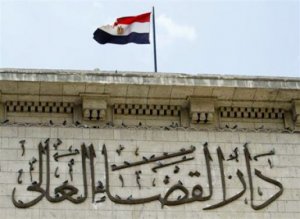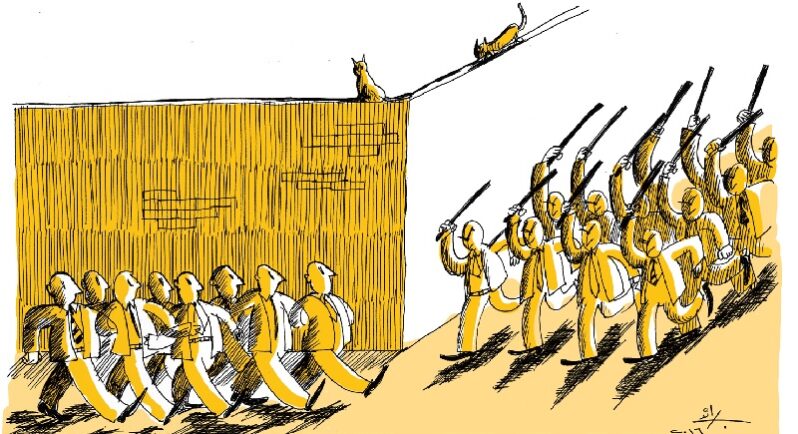Barring Lawyers from Entering Prosecution Premises: A Stay of Execution

“Not for one day has the judiciary of Egypt ever been isolated from its people –not physically nor intellectually– such that it is unable to understand their plight. The doors of the courts and public prosecution have always been open to the citizens. The people of Egypt have held a firm conviction that the judiciary is the refuge of the wronged, and the buttress of the weak; that if truth is lost anywhere else in the state, it is safeguarded in the judiciary’s hands; and, that if justice disappears or is taken away from them, it can be found in the judiciary’s rulings… Egypt has witnessed eminent lawyers devote their lives to defending rights and seeking justice. Judges have acknowledged the position of the law profession, and lawyers have preserved the standing of judges and supported and defended them against any attacks on their jurisdiction or independence.”
These were the important grounds with which Egypt’s Court of Administrative Justice –in a judgment issued on June 21, 2016– summarized the reasons for staying the execution of the decision to bar lawyers from entering the State Security Prosecution premises. The importance of these grounds stem from the Public Prosecution’s intransigent treatment of lawyers, and the latter’s subjection to a number of unprecedented abuses concerning the right of defense. It reflects the court’s view of lawyers –a view based on mutual respect, parity, and appreciation of the [law] profession– and not the disdainful view that has recently spread through some courts and public prosecution departments.[1] Evidence of the recent deterioration of the relationship between lawyers and the judicial apparatuses includes the relocation of the Prosecutor General’s office to the Al Rehab district in Cairo’s suburbs, and the forcing of lawyers to deal with staff of the premises instead of meeting the Prosecutor General or prosecutors. Lawyers have also been barred from entering the State Security Prosecution premises.[2] Malek Adly, Sameh Samir, Muhammad Isa, Mohamed Azab, and other lawyers have filed a contestation of this last decision in order to attain a summary stay of execution and a substantive ruling to annul it. This article will discuss the Court of Administrative Justice’s ruling to stay the execution of said decision until the case to annul it is resolved.
Regulating Lawyers’ Entry into the State Security Prosecution Premises: An Administrative or Judicial Act?
One issue that the administrative judiciary faces whenever a decision issued by a judicial authority is contested relates to the nature of said decision. Specifically, does it constitute an administrative act that may be contested before the administrative judiciary, or is it a purely judicial act? This question was raised previously in the case contesting the media gag order that had been issued in the case pertaining to fraud in the presidential elections. In that instance, the court declared itself competent on the basis that such a decision is administrative, and that the character of a legal act is determined by “its nature and essence irrespective of its issuer”.[3] The court adopted this jurisprudence in the judgment staying the execution of the decision to bar lawyers from entering the State Security Prosecution premises, as it reviewed the nature of the decision and not the authority that issued it.
Consequently, the court found that the president of the Supreme Judicial Council, the Prosecutor General, the advocate general of the Supreme State Security Prosecution, the minister of justice, and the minister of interior (i.e., the respondents) in this case represent the administration and not a judicial authority. On that basis, the court stated that “enabling lawyers to enter the public prosecution and court premises to perform their professional tasks is a duty borne by the administration pursuant to the Constitution and the laws that will be detailed in this ruling”. It also stated that “the administration’s lack of intervention to remove the barriers, obstacles, and restraints that are placed in the path of lawyers trying to perform their professional tasks, and that prevent them from entering public prosecution and court premises constitutes an administrative decision disputable before this court, not an act of the judiciary”.
By establishing its oversight over all administrative acts irrespective of their issuer, the administrative court is asserting its jurisdiction over a large number of decisions; and, consolidating citizens’ right to litigate and lodge complaints against them, as well as strengthening its protection of public rights and freedoms.
The Rule of Law as the Basis for Regulating the Relationship Between the Judiciary and the Law Profession
In its ruling, the court cited the constitutionally stipulated principle of the rule of law, which governs the state authorities and their relationship with the citizens and deemed it the foundation of the state structure. The court affirmed that the Constitution regulated the powers of the judiciary, public prosecution, and the law profession and guaranteed that lawyers enjoy “the necessary guarantees and protections” while practicing the right of defense before the courts, and the investigation and evidentiary authorities. The court also deemed that lawyers, prosecutors, and judges are partners in the administration of justice, and justice can only be realized if there is a balance between the power to indict and the right of defense. The prosecutor and judge represent the state’s power to investigate, charge, and issue rulings, whereas lawyers represent the power of conscience when they perform the duties associated with the right of defense. Here arises the question of the essence of the right of defense, and whether it is limited to the mere presence of a lawyer with the accused during the stages of investigation and trial.
The Essence of the Right of Defense
Article 54 of the Constitution stipulates that a lawyer must be informed immediately upon the arrest of a client, and that an arrestee may only be interrogated in the presence of their lawyer or one appointed for them. This is the article that guarantees the right of defense in the current Egyptian Constitution. The court deemed that Article 54 annulled any text in the Code of Criminal Procedure that permits the interrogation of accused persons in the absence of a lawyer,[4] which suggests that there are articles in the Code that are of suspect constitutionality. Thus, the Egyptian legislature must promptly pay special attention to reviewing said Code, which is one of the most important laws that guarantees the right of defense and is responsible for protecting citizens from abuse by law enforcement officials (such as police officers), and for creating a balance between the power to investigate and indict, and the right of defense. The court also rejected the notion that declaring the investigation in a certain case confidential should bar the lawyer from being present with the accused, or from entering the prosecution building wherein the investigation is occurring; this is the plea that the State Lawsuits Authority submitted to justify the decision barring lawyers from entering the State Security Prosecution premises.
The court interpreted that the duty of defense is borne by the investigating authority and the court, on the one hand, and by lawyers, on the other. The former must enable accused persons to contact their lawyer or appoint one for them and may only begin interrogating once a lawyer is present; while the latter have a duty of performance to expend all necessary efforts and energy to defend the accused, and bare the burdens of doing so under pain of penal or disciplinary punishment pursuant to the law. The court explained that the duty borne by the investigating authority and the court is not limited to ensuring the formal presence of a lawyer; rather, they must also enable the lawyer to contact the accused, attend the interrogation process, view the investigations, allegations and legal documents and, obtain all data related to the claims that they initiate. Lawyers must present every defense that they see fit, and the court or investigating authority must accept or reject said defenses pursuant to the law.
For the sake of fulfilling the duty of defense, all lawyers enjoy the right to “dignified” entry into court and prosecution premises as said premises are their workplace wherein they perform their function and their duty to defend.
Accordingly, the court found that the legislature may not restrict a constitutional right such as the right of defense in a manner that fundamentally undermines it, and that a fortiori the administration may not restrict or constrain the practice of said right, not even indirectly. Hence, placing restrictions on lawyers’ entry into court and public prosecution premises, or on the administrative functions that the law guarantees lawyers may perform, detracts from lawyers’ right to defend and from the rights of accused persons. Based on the above, the court found that the decision barring lawyers from entering the State Security Prosecution premises violates the Constitution, the Legal Profession Law, and the Code of Criminal Procedure, and encroaches on the rights of lawyers and the right of defense. Subsequently, the court stayed the execution of the decision until the case filed to annul it is resolved.
This article is an edited translation from Arabic.
__________
[1] See: Menna Omar’s, “Who Protects Egyptian Lawyers? (II)”, published online by The Legal Agenda on July 3, 2016 (in Arabic) and on July 14 and 21, 2016 (in English).
[2] Ibid.
[3] See: Menna Omar’s, “Is the Administrative Judiciary Stopping Gag Orders in Egypt?”, The Legal Agenda, February 26, 2016.
[4] For example, see Article 124 of the Code of Criminal Procedure, which permits the interrogation of the accused in the absence of a lawyer in the cases of flagrante delicto, and urgency stemming from fear of loss of evidence.



